Key points:
-
Anxiety appears little by little, while panic attacks happen abruptly.
-
Anxiety is a response from our body to situations that are being experienced
-
It is recommended that those who live with a person with anxiety have information on how to react in this situation.
Throughout our lives, we could experience one or more anxiety attacks, says Dr. David Szydlo Kon, a psychiatrist specializing in somatic symptom diseases at ABC Medical Center.
Anxiety is an emotion that occurs as a response to a series of situations that are being experienced. It can be considered an alarm signal of the body and mind that prevents the body from functioning properly.
It is normal for people to confuse anxiety with depression, although these disorders may be comorbidities (the presence of two or more disorders that occur at the same time) it does not mean that they are the same.
In general terms, it can be considered that depression is a state that has to do with the feeling that there is no future, feelings of unworthiness, and uncertainty about where to go next.
While anxiety is a state of fear and restlessness, which almost always heads toward dysfunctionality.
“In 2019, 301 million people suffered from an anxiety disorder, including 58 million children and adolescents. Anxiety disorders are characterized by excessive fear and worry and related behavioral disorders. The symptoms are severe enough to cause significant distress or functional disability. There are different types: Generalized Anxiety Disorder (characterized by excessive worry), Panic Disorder (characterized by panic attacks), Social Anxiety Disorder (excessive fear and worry in social situations), Separation Anxiety Disorder (which is excessive fear or anxiety in the face of separation from those individuals with whom the person has a deep emotional bond), etc.”1
What are anxiety symptoms?
Different symptoms can occur during an anxiety attack, these include shortness of breath, chest tightness, sweating, a feeling of electricity in the arms or legs, the perception of hearing or seeing distantly, and difficulty focusing.
All of these symptoms are a natural response from the body, as it is going into survival mode and somehow trying to get out of this anxious state, says Dr. Szydlo.
Although medically speaking there are many classifications of anxiety, in general terms it can be divided into three stages:
Normal anxiety
All everyday situations fall into this category, although they affect us, we tend to handle them very well thanks to the tools that we have acquired throughout life and that allow us to respond to these situations.
Social trauma
Physical symptoms begin to appear when anxiety prevents the person from moving forward. This stage can last from a few days to a few months or years.
Panic attacks
The reality is that it is something completely different, but generally speaking, people classify it as another stage of anxiety.
A panic attack comes on abruptly, usually a few seconds after feeling normal, with very strong palpitations, chest pain that could be mistaken for a heart attack, excessive sweating, and inability to think or move. Anxiety attacks come on little by little, allowing us to do something about it and use the tools we have and the ones we have acquired throughout our lives, to cope with or defeat this anxiety.
How can you control anxiety?
Anxiety is an alarm signal that can come as a result of external stimuli such as situations that we experience, or due to internal stimuli as a result of our thoughts or feelings.
Different tools help fight it and that includes psychopharmaceutical medications, which must be prescribed by a doctor, such as antidepressants, antipsychotics, or anxiolytics.
The patient can also use different psychotherapy techniques. The most common in this type of anxiety problem is cognitive-behavioral therapy, which tries to focus fundamentally on people’s behavior and thinking.
We must bear in mind that an anxiety disorder is a result of what we think and not what we feel. Anxiety can arise at the thought of missing a plane, thinking about being late for an event, thinking that you may fail an exam, etc.
How to live with a person with anxiety?
Dr. Szydlo says that living with a person who suffers from these stages can become very difficult to understand and assimilate what they are experiencing. Being common to say “Just don’t get nervous”. But all of us who are around a patient with anxiety must understand that they cannot control their feelings.
If you have a patient with anxiety, it is recommended to talk to a doctor or specialist to have a better understanding of these conditions and how they can be managed.
Physical support is also a great tool, this is focused on breathing techniques and reminders to use prescribed medications.
Like any other pathology, anxiety has a diagnosis, physiology, and treatment. Therefore, their attention goes beyond “cheer up” and it is necessary to address a medical or psychological treatment to overcome this situation.
It must be remembered that the earlier these pathologies are treated, the faster they will feel better, less hurt, and with a lower probability of relapse.
At ABC Medical Center’s Neurology Center, we can provide you with specialized care. Contact us!
Fuentes:
Dr. David Szydlo Kon, a psychiatrist specializing in somatic symptom diseases at ABC Medical Center.
https://youtu.be/70PW33VgV9E
1 https://www.who.int/es/news-room/fact-sheets/detail/mental-disorders


